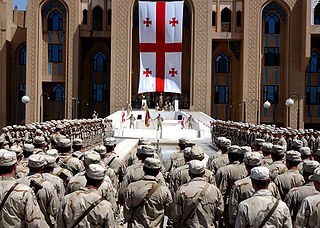 W
WA constitutional referendum was held in Georgia on 2 November 2003 alongside parliamentary elections. The constitutional changes proposed would reduce the number of seats in the next Parliament of Georgia from 235 to 150.
 W
WParliamentary elections were held in Georgia on 2 November 2003 alongside a constitutional referendum. According to statistics released by the Georgian Election Commission, the elections were won by a combination of parties supporting President Eduard Shevardnadze.
 W
WThe Georgia Train and Equip Program (GTEP) was an American-sponsored 18-month, $64-million program aimed at increasing the capabilities of the Georgian armed forces by training and equipping four 600-man battalions with light weapons, vehicles and communications. The program enabled the US to expedite funding for the Georgian military for Operation Enduring Freedom.
 W
WGeorgia joined the Iraq war as part of the United States-led coalition in August 2003. By 2008, Georgia had deployed 2,300 troops in Iraq, becoming the third largest contributor to the coalition forces in the Iraq War. In addition, the country provided a battalion of approximately 550 troops to the United Nations Assistance Mission in Iraq. All Georgian troops were withdrawn from Iraq amid the Russia–Georgia war in August 2008. Georgia suffered five fatal casualties in Iraq.
 W
WThe Pankisi Gorge crisis was a political crisis with military dimension in Georgia early in the 2000s. Georgia was pressured by Russia and the United States to repress the threats of Al-Qaeda in the Pankisi Gorge.
 W
WThe Revolution of Roses, often translated into English as the Rose Revolution, was a change of power in Georgia in November 2003. The revolution was brought about by widespread protests over the disputed parliamentary elections and culminated in the ousting of President Eduard Shevardnadze, which marked the end of the Soviet era of leadership in the country. The event derives its name from the climactic moment, when demonstrators led by Mikheil Saakashvili stormed the Parliament session with red roses in hand.
 W
WUnited Nations Security Council resolution 1494, adopted unanimously on 30 July 2003, after reaffirming all resolutions on Abkhazia and Georgia, particularly Resolution 1462 (2003), the Council extended the mandate of the United Nations Observer Mission in Georgia (UNOMIG) until 31 January 2004 and endorsed the establishment of a police component.